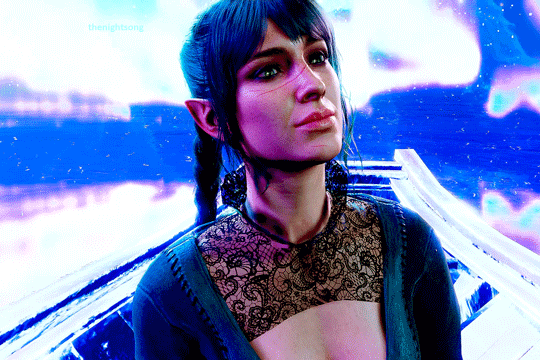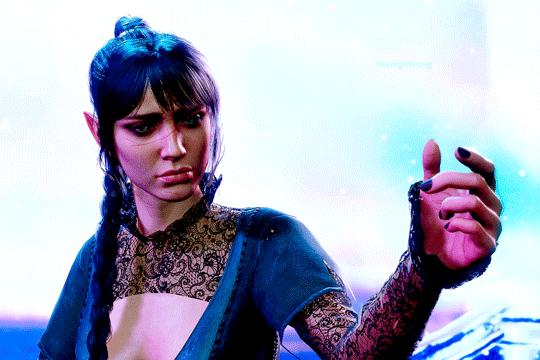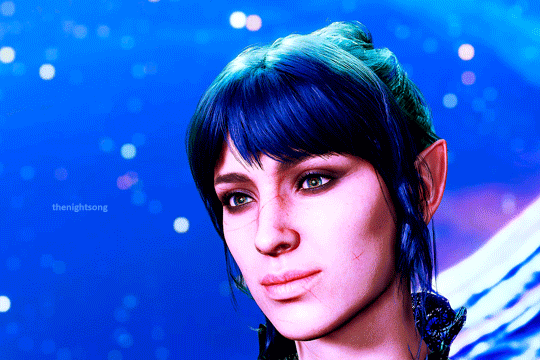#gale has some of the best scenes fr
Text



Baldur's Gate 3 - Shadowheart in the Outer Planes
#shadowheart#bg3#baldur's gate 3#baldur's gate#bg3edit#gamingedit#videogameedit#lgbtvideogames#videogamewomen#my edit#i love this scene so much#gale has some of the best scenes fr#loml
227 notes
·
View notes
Note
(anon feral about Wyll transformation scene again) Do you think he has nightmares after that? dreams where he's human and then wakes up a devil and has to readjust all over again? nightmares where the transformation is worse, more drastic, more monstrous? nightmares where it happens again? where the devilish nature makes him do, or want to do, something monstrous?
when he wakes up from one of those do the changes hurt, or seem to hurt, again? does he go to anyone for comfort or try to soldier on? does he yearn for how he looked and felt before, even while he does his best to accept the changes and move forward? does Karlach notice him having a hard time and go try to comfort him somehow, because she knows that was all because he wanted her to live?
Karlach's engine was put in there against her will, Astarion got vampire'd against his will, do those two ever talk to Wyll about it from the angle of someone who's gone through something not the same but comparable? do they want to help get him away from Mizora before she can do anything worse to him, both knowing that it never stops at just the transformation, not wanting to find out what she would do to him next? (Karlach knows from an angle of having been used after the 'upgrade' as a devil's warrior and attack dog, Astarion knows from an angle of having been used as a vampire's tool and plaything, and from what they see of how Mizora treats Wyll she very well might do any/all of that or find some new other terrible thing to do)
when he realizes they have overlapping traumas like that do you think he seeks them out for help or comfort, or to try to help/comfort them because he's like that? do you think even the companions who don't 100% get the specific "somebody painfully physically transformed you against your will for their own gains" trauma notice him sleeping fitfully sometimes and recognize the same kind of pain in his voice that they heard that night when he was transformed and they just know what that nightmare was about?
it's late and I'm rambling but YOU KNOW???? WYLL...
(I haven't even made it through act 2 yet and I'm already like this about him)
considering wyll still has nightmares of him being exiled 7 years ago? he definitely gets nightmares about this one too. the readjustment period is another thing altogether - his skull is heavier, he has to rebalance his center of gravity to stand up straight, and everything else in between. it's a lot to handle, both in reality and in his sleep.
(also thinking about the last time something drastic physically happened to him is when he lost his eye 🥲 and now here he is again trying to readjust his life)
this is headcanon territory but - that man is a Sulker... whenever he thinks he's alone he just kinda mopes about it all. but it's also sooo obvious that he's not okay and that he's just putting up a front.
karlach definitely does everything she can to cheer him up. whether that be cracking the shittiest jokes (that wyll laughs at so earnestly) or playfighting with him. astarion does it in his own prickly way, like a cat pretending not to be endeared by wyll - offering to bite him to give him a good night's nightmare-less rest. gale cooks wyll's favourite dish as a morale boost - even though fresh ingredients are hard to come by. lae'zel offers to spar with wyll to take his mind off things, or just telling him how great a warrior he is and how she'd love to [redacted] his [redacted] (LMAO). shadowheart would tease wyll about his affinity for trashy romance novels, giving him a backhanded compliment on how hot he looks with his horns, and that his new look would fit in the cover of a trashy romance novel (that she'd totally read and enjoy).
whenever mizora appears in camp, everyone just forms a wall between wyll and mizora like a phalanx. wyll protection sequence activate.
i also like to think wyll recognizes that he's no longer alone in his suffering. he's not as isolated as he once was! that's why he's so eager to make friends, why he gives approval on every question you ask him. he's grateful to have these people who care for him, especially his bestie karlach who'd give her life for him and vice versa 🥺
(get yourself ready when you get to act 3... honey youve got a big storm coming.gif)
46 notes
·
View notes
Text
She Made It After All
"I'm not a great actress who can create a character. I play me."
Those were the words of the television icon Mary Tyler Moore, who, as you surely know, recently died of cardiopulmonary arrest with complications from pneumonia, to a journalist, summing up what, as she saw it, was her acting technique. Not only were said words incorrect by and of themselves as, as the TV-interviewing legend Dick Cavett pointed out, they represented a leonine misunderstanding of what comprises a believable and effective performance, they were an entirely unjust minimization of what she gave us television viewers these many years. And what she gave us television viewers these many years was unvarnished gaiety and laughter, not to mention, quite often, heart-tugging moments.
It all started, for me as with everybody else, when she portrayed the housewife/mother Laura Petrie on the classic TV sitcom The Dick Van Dyke Show. Like everybody else, I have fond memories of her strutting about in those tight black capri pants--which would alternate with a light-colored skirt--and looking quite scrumptious (The renowned cinema director Rob Reiner told a Playboy Magazine Interviewer a very humorous story concerning those pants. One day while Reiner was on the Van Dyke Show set--his Dad, of course, was the head honcho of the show--he became so turned-on looking at Moore in the aforementioned pants that he reached up and literally touched her ass. Moore, need it be said, was shocked and, need it be said, immediately told Reiner's Dad what his son had done. Which prompted the following dialogue between the Reiner father and the Reiner son. Father: "Did you touch Mary Tyler Moore on the ass?" Son: "Yeah." Father: "Well, don't do it again").
There are two scenes Moore was in during her time on that show wherein she most fully showed what she could do, wherein she best displayed her monumental comedic-acting chops.
.Sally (Rose Marie, of course), who usually did the typing during the Alan Brady writers' sessions, was--for a reason that, alas, has completely escaped my memory--unable to come to work. So Rob (Van Dyke, of course), after quite a lot of prodding from her, consented to allow wife Laura to fill Sally's place at the typewriter. During Laura's day on the job, she made a number of suggestions regarding the writing, some of which were quite good (Example: Rob and his colleague/friend Buddy [Morey Amsterdam, of course] had written a script wherein it was asked: "Why should we [Americans] want to go to the moon?" To which Laura piped up: "To find out whether it's chewy or chocolate cream"). Rob, however, rather than welcome his wife's input, was downright savage toward her, rather crudely telling her that she wasn't there to assist in the writing but to type and to stick to that. This behavior, sad to say, repeated itself several times. Naturally Laura became frustrated but when she tearily protested, Rob carved into her yet again ("You've been nothing but trouble ever since you've been here"). This of course was for Laura the straw that broke the camel's back and, after telling hubby off in kind ("The purpose [for my coming here] was to help you"), she stormed out, proclaiming: "I'm fired!" (Which caused Rob to yell after her: "You can't fire! I quit you!").
It was Moore's effortless charm during the office-writing scenes and, later, her deftly summoning just the right amounts of vulnerability and hurt in reacting to Van Dyke's verbal abuse that made that episode work, that were wholly responsible for its winning humanity.
.A teenage girl with whom Rob had become good friends--I, alas, have forgotten just what her position was in the episode--had developed a fervent crush on him, going so far as to openly tell him that she wanted to marry him. At first Laura was bemused by this but, as time wore on, she understandably became pissed. Which caused this dialogue between the Petries.
Rob: "I'll tell [the girl] that if I marry her, you'll kill yourself."
Laura, sardonically: "No, if you marry her, I'll kill you both."
(After a bit more dialogue)
Rob: "Well, I'm not going to marry [the girl]."
Laura, with equal sarcasm: "Well, that's good news."
It was the unforced sass and pointed wit Moore displayed in this scene that had you watching, that kept you laughing.
And Moore got even better when she got her own namesake television sitcom. The Mary Tyler Moore Show to this day stands as one of the most thoroughly stylish, most firmly adult sitcoms in network-TV history--indeed, there is considerable evidence to support the argument that it's the best such program in network-TV history. It was TV Guide that reported that when the show was being put together, CBS executives sent memos urging that there be "block comedy" scenes, like Moore being trapped in a roomful of monkeys and that "to jazz up the story," Moore "should date a visiting European prince." Happily, there were no--no--such times on the show. At all times--at all times--The Mary Tyler Moore Show grounded its humor in the recognizable and the believable. Also: Said program's episodes were always, always filled with what Moore herself would call "articulate, witty humor," never, ever devolving into the kind of televised hollering matches that were a staple of the "groundbreaking," vastly-overrated All in the Family--and, come to think of it, all of Norman Lear's prime-time sitcoms (One Day at a Time being the sole--the sole--exception). And while the Moore Show often dealt with topical subjects--anti-Semitism, the rise of the "happy-talk" television-news programs during the 1970s, the inequality in pay women experience in comparison with men--there was never, never the kind of self-applauding, look-Ma-we're-Dealing-With-An-Issue air that the Lear sitcoms--again, One Day being the only exception--took on when they did the same. Au contraire, the Moore Show's issue-exploration was always marvelously matter-of-fact, always blissfully devoid of self-indulgent chest-thumping.
There were two episodes of the Moore Show, in particular, wherein its lead player best showed off her enormous talent, were the best frames for her towering ability.
.One episode--which was written by David Lloyd, who, come to think of it, wrote the vast majority of the funniest Moore Shows--began with Mary Richards (Moore, of course) happily working in front of a typewriter. We soon find out that she's written a short story, which she eventually gives to her boss/buddy Lou Grant (Ed Asner, of course), fervently urging him to read it and give her feedback. When Grant demurs on the grounds that if he tells Mary he doesn't like it, she'll resent him, she earnestly assures him that that won't happen ("Rather than hate you, I'll love you that much more"). Well, Grant agrees to read Mary's story and, after he does, gives her his honest reaction, which is quite negative. Despite the facts that Grant's negativity is given 1) very hesitantly and 2) very tactfully, Mary, as the man himself warned her she would be, is quite resentful ("You're really having a good time, aren't you, Mr. Grant?"). Being intensely pissed off, Mary storms toward the door, first telling off Grant ("[The fact that you don't like my story] doesn't mean that you're wrong and I'm right. It does mean, however, that you can do your own damn baby shopping"), then storming out, indignantly slamming the door behind her. We next see the two of them at a gathering at Mary's apartment, with Grant assuring her that he'll have her laughing again--by tickling her (Mary, with mega-intense sarcasm: "My, is there no limit to the realms of your expertise?"). Grant tickles her, but no dice: Mary doesn't even so much as crack a smile ("Would you like a feather?" she asks him). Naturally Grant gives up, repeating his view that Mary's story is inferior and telling her that she knows it. Here Mary, livid at him, blatantly lies, telling Grant that a major publication has bought her story. Grant, being chastened, backs off from his initial reaction ("I've never been so glad to have been proven wrong in my life"). Yet in time Mary confesses to him that she was lying--a fact, we find out, Grant knew all along. Here Grant throws down the gauntlet ("Mary, I don't know how you want to be treated...Do you want me to puff up your ego?...Treat you like some boob?"). To which Mary replies: "God, yes!" Knowing when he's licked, Grant at last finally tells our Mary what she wants, and has wanted from the start, to hear: "Mary, I loved your story."To which she smiles beatifically, coos: "Thank you, Mr. Grant," and, still smiling rather vapidly, leaves.
The comedic brio Moore showed in that episode, going from comedic earnestness to comedic disappointment to comedic manipulation to, at last finally, comedic satisfaction with stunning ease, powered that episode, gave it heft and spice.
.Through a series of events that would take too long to detail, Mary discovers that Grant had a one-night stand with Happy Homemaker Sue Ann Nivens (Betty White, of course). Grant of course demands that Mary sit on this information, not tell anybody for fear of how Sue Ann will react, an insistence that sends Mary into gales of laughter ("What are you afraid [Sue Ann] will do, hold a spatula to your throat?"). However, Grant persists and Mary, solely to pacify Grant, crosses her heart--as Grant demands she do. Yet in a very brief time Mary, in an act of damnable--and entirely uncharacteristic--insensitivity, breaks her vow and freely tells news writer Murray (Gavin MacLeod, of course) of Grant and Sue Ann's one-nighter. When Grant finds out about Mary's betrayal, he is of course deeply hurt and, displaying admirable maturity here, breaks off the friendship he had with her "I still respect you as a producer. I still want you to work here. We're still a business. But we're not friends any more"). Mary, fully distraught at this, breaks into tears, pleadingly urging Grant to reconsider. Her boss and former friend, however, is having none of it ("Have you finished crying so we can get on with business?"). In time, though, Grant hooks back up with Sue Ann, there's some business--sad to say, I've wholly forgotten what it consisted of--and then Grant returns to his office, where he discovers an anxious Mary. She after a while tells him about what she claims was a one-night stand, similar to the one Grant had with Sue Ann, with a leading TV-news person. And that leading TV-news person was, she dramatically claims: "Walter Cronkite." She sees Grant struggling to suppress a smile, so she goes at it a second time: "Roger Mudd?" She witnesses Grant struggling even harder to keep from smiling, so she bores in: "If you smile, that means we're friends again." The episode ends with Grant not only freely smiling but freely hugging Mary--clearly saying that he's fully forgiven her and that the close and deep friendship they shared is back on track.
It was in this episode that Mary fully, fully shined, being charmingly bemused upon hearing of Grant's assignation with Sue Ann, being charmingly gossipy when going against her crossing-of-the-heart and spilling the beans to Murray, and, at last finally, confronted with Grant being justly hurt by Mary's insensitivity and his ending the friendship he had with her and her struggling--successfully, as it happily turns out--to regain that friendship, being deeply moving and appealingly human.
It is all this great work, spanning not just one but two decades, that brings on prodigious regret and prodigious sadness that this girl who could turn the world on with her smile has been forever taken from us. However, we're compensated by the fact that, being able to catch her uber-deft comedic acting in not one but two television sitcoms thanks to DVD, we can savor her applying her stupendous talent and her stupendous professionalism--and, again, thanks to DVD, see with the Moore Show in particular that, in regularly bestowing upon us that talent and that professionalism, she really and truly did make it after all.
#Mary Tyler Moore#dick cavett#laura petrie#The Dick Van Dyke Show#rob reiner#the mary tyler moore show#TV Guide#All in the family#norman lear#one day at a time#Lou Grant#Ed Asner
3 notes
·
View notes